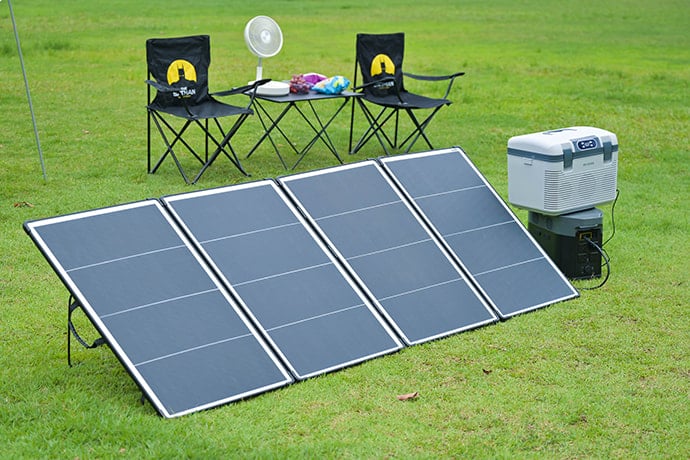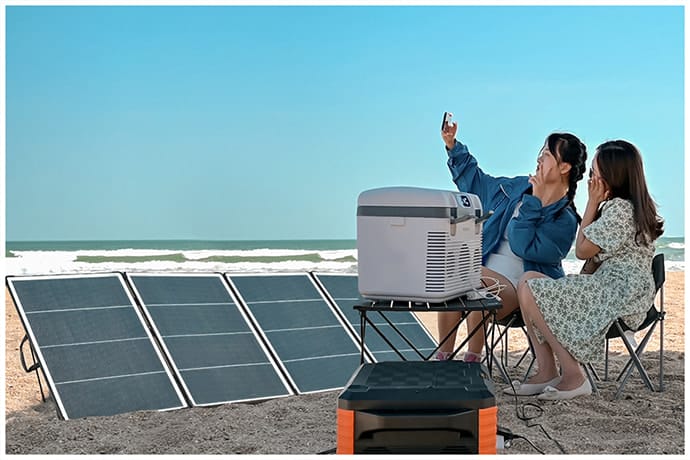When it comes to keeping your food and beverages cool on the go, a portable refrigerator is a game-changer. Whether you’re camping, road tripping, or simply need a reliable cooling solution outside of your home, having a fully charged portable refrigerator is essential. You can choose the most suitable and efficient way to charge your portable refrigerator quickly.
Solar Power: Harnessing the Sun’s Energy
One of the most popular and environmentally friendly methods of charging a portable refrigerator is through solar power. Here’s how it works and the pros and cons associated with it:
Advantages of Solar Power Charging:
Renewable and Clean Energy:
Solar power relies on harnessing the energy of the sun, making it a renewable and sustainable option. By using solar power to charge your portable refrigerator, you reduce your carbon footprint and contribute to a greener future.
Off-Grid Charging:
Solar power allows you to charge your portable refrigerator even in remote areas without access to traditional power sources. This makes it ideal for camping trips or outdoor adventures where electrical outlets may not be readily available.
Cost Savings:
While the initial investment in solar panels and a solar power system may be higher, solar charging can save you money in the long run. Once installed, the sun’s energy is free, eliminating the need to rely on electricity or fuel for charging.
Disadvantages of Solar Power Charging:
Weather Dependency:
Solar power charging is highly dependent on sunlight. Cloudy or rainy days can reduce the charging efficiency, potentially prolonging the time required to charge your portable refrigerator fully.
Initial Cost:
Setting up a solar power system, including solar panels and a charge controller, can be costly initially. However, it’s important to consider the long-term savings and environmental benefits associated with solar charging.
Battery Charging: Power On-the-Go
Another commonly used method to charge a portable refrigerator is through battery charging. Here’s what you need to know about this method and its pros and cons:
Advantages of Battery Charging:
Portability and Convenience:
Battery charging allows you to charge your portable refrigerator while you’re on the move. You can use a separate battery or the vehicle’s battery to power up your refrigerator, ensuring that your food stays cool during long journeys.
Versatility:
Battery charging is not limited to a specific power source. You can charge your portable refrigerator using various batteries, such as deep cycle batteries or car batteries, depending on the available options.
Quick Charging:
Battery charging methods often provide a fast and efficient way to charge your portable refrigerator, ensuring that it reaches the desired temperature quickly.
Disadvantages of Battery Charging:
Limited Battery Capacity:
The capacity of the battery determines how long you can power your portable refrigerator. Depending on the battery’s capacity and the power consumption of the refrigerator, you may need to recharge or replace the battery more frequently.
Battery Drain:
If you solely rely on your vehicle’s battery for charging, there is a risk of draining the battery, which can leave you stranded in a remote location. It’s important to monitor the battery’s charge level and have a backup plan in case of emergencies.

AC/DC Charging: Flexibility and Adaptability
AC/DC charging refers to using both alternating current (AC) and direct current (DC) power sources to charge your portable refrigerator. Here are the pros and cons of this method:
Advantages of AC/DC Charging:
Flexibility:
AC/DC charging provides flexibility as it allows you to charge your portable refrigerator using both AC power sources, such as electrical outlets, and DC power sources, such as vehicle batteries. This versatility ensures that you can charge your refrigerator in various settings, whether you’re at home, on the road, or at a campsite.
Reliability:
AC/DC charging ensures a reliable power source for your portable refrigerator. You can switch between AC and DC power depending on the availability and convenience of the power source, ensuring that your refrigerator remains powered and your food stays fresh.
Constant Power Supply:
With AC/DC charging, you can keep your portable refrigerator connected to an AC power source, such as a wall outlet, while it’s available. When you’re on the move or in a location without an electrical outlet, you can seamlessly switch to DC power, such as your vehicle’s battery, without interrupting the cooling process.
Disadvantages of AC/DC Charging:
Dependency on Power Sources:
AC/DC charging requires access to both AC and DC power sources. If you’re in a remote area or during power outages, you may not have access to either power source, limiting your charging options.
Potential Power Limitations:
The power output from certain AC power sources, such as inverters or generators, may have limitations that could impact the charging speed or efficiency of your portable refrigerator. It’s important to ensure that the power source can meet the energy requirements of your refrigerator.
Charging your portable refrigerator quickly and efficiently is crucial for maintaining the freshness of your food and beverages, especially during outdoor activities or in situations where traditional power sources may be unavailable. By exploring different charging methods, such as solar power, battery charging, and AC/DC charging, you can choose the option that best suits your needs and circumstances.
The article comes from: https://www.sungoldsolar.com/
Your most sincere solar partner – Sungold








